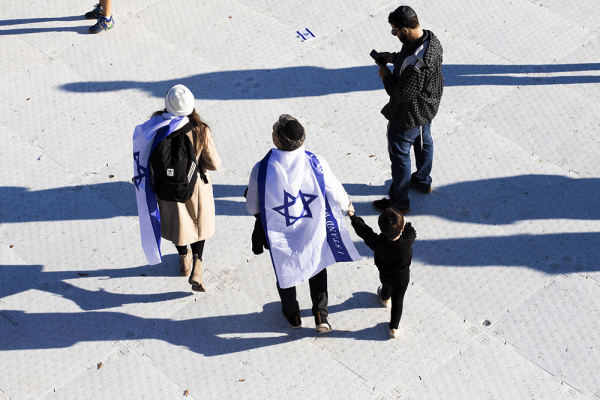When I was growing up in northeastern Pennsylvania in the ’80s, it was a matter of faith that Israel was a refuge. I don’t know that anyone flat-out told me that Israel would take me in if my Gentile neighbors suddenly instituted pogroms or another Holocaust, but it was at least a not-so-veiled suggestion.
We brought our nickels to Hebrew school every week to send to Israel, the land of milk and honey. We learned about the Holocaust, and that the Jewish diaspora was not truly safe. I lived in America and was American, but I was told I couldn’t trust America. I could, though, if worse came to worst, trust Israel. Israel was a promise, a shelter, and a kind of paradise. I didn’t know much about it except that it was good and safe and if the need should arise, there would be a place for me there. Israel passed a “law of return” in 1950 which guarantees citizenship to anyone with a Jewish grandparent. The law of return is the foundation of American Jewish conceptions of Israel as a place of refuge; we all, in theory, have easy access to Israeli citizenship. If the Nazis take over here, we can just go to Israel.
I’m older now and a good bit more skeptical about Israel’s virtue and Israel’s safety. I am far from convinced that Israel could or would serve as a refuge from violence for the American Jewish diaspora — the home of the majority of Jewish people outside Israel. And I think that viewing regions across the world in which the diaspora has settled to be temporary or lesser than ideal is dangerous to Jewish people and to the Jewish experience.
The message that Israel is necessary and sanctified as a refuge from antisemitic violence in the diaspora still retains a lot of power, and this is not just a message told to children.
For example, on Oct. 30, The Wall Street Journal editorial board made the link explicit in an editorial titled “The Global War on the Jews,” with the subtitle “Anti-Semitism surges, even in the West, which shows why Israel exists.” The piece goes on to argue, partially responding to calls for a cease-fire between Israel and Hamas due to humanitarian concerns, that “No leader who is demonstrably incapable of protecting Jews in his or her own country should try to prevent Israel from defending itself. This is how the West slips from ‘never again’ into ‘nowhere is safe.’”
The message is clear: Diasporic Jews aren’t safe. Israel, therefore, has the right and the duty to do whatever it deems necessary to secure itself as a Jewish refuge. From this view, antisemitism becomes an inarguable justification for any and all of the Israeli government’s actions.
It’s true that Israel has, due to various needs, taken in many Jewish people. It’s a major destination for Jewish immigrants today, especially from Russia. When Jewish people in the Middle East and North Africa faced increased discrimination and violence during World War II, Israel was also an important place of escape. Eventually, hundreds of thousands of Middle Eastern Jews, or Mizrahi, fled to Israel after its establishment in 1948. Their descendants remain central to Israeli society and culture.
But while Israel has been a refuge, so have other nations. The United States, in particular, has long been a destination for Jewish people facing persecution. My own grandparents, on both sides, were among the 1.5 million Jews who fled persecution, pogroms, and relentless antisemitic violence in Eastern Europe and Russia between 1881 and 1910.
Jewish people faced persecution in the U.S. too, of course; my mother’s father Anglicized the family name to avoid discrimination. But Mizrahi in Israel have also, both in the past and still today, experienced employment discrimination and erasure from national narratives.
Immigration — to Israel or anywhere else — can provide a vital escape from violence.
There is nowhere on earth that is a perfect refuge from injustice for anyone, and certainly not for Jewish people. Those who support the state of Israel, like The Wall Street Journal’s editorial board, point to antisemitic violence as evidence that Israel is necessary and its policies aren’t to be questioned so long as they keep Israeli and Jewish people safe. In this view, Israel is a safe haven from antisemitic violence across the diaspora. But as the recent horrific attacks by Hamas make clear, violence against Jewish people not only happens among the diaspora but also within Israel itself.
Moreover, there is a broad consensus across the political spectrum that Hamas’ success was enabled by sweeping intelligence failures, and by the hubris of Israel’s Prime Minister Benjamin Netanyahu and his government. The Israeli government’s abrogation of its duty to its citizens, Jewish and otherwise, was stunning and shameful. Governments in the diaspora often do not support Jewish residents and citizens. But Netanyahu’s failures show that the government of Israel can also fail Jewish people.
There’s just no guarantee that Israel will — in some dystopic future — be the safest option for Jews everywhere. If, God forbid, the U.S. becomes a virulently antisemitic fascist state — which is what U.S. Jewish people are imagining when they say Israel may be a refuge for them — Israel would certainly be at risk as well. Israel, after all, relies on the U.S., which has contributed some $130 billion in military aid to Israel over the last 70 years. An Israel so dependent on U.S. backing is not really, in any meaningful sense, an alternative to or a refuge from a potential American antisemitic turn.
As throughout Jewish history, so it is now: There is no magic guarantee for safety. The Jewish diaspora has responded to this truth of insecurity by putting roots down in many places. We’ve done so with the recognition that no one place is perfect or safe, but with a faith that we can work to make wherever we are better, more welcoming, and freer for Jewish people — and ideally not just for Jewish people. The vision of diaspora is a vision not of Jewish control or Jewish dominance but of cosmopolitanism, of sharing, of allowing your neighbors to transform you as you transform them. Safety can reside not in controlling land and borders, but in an openness that sees belonging as portable and communal.
This vision is often derided as naive, implausible, or even as insufficiently virile or powerful. But diaspora as an ideal has long been a central part of Jewish identity. Adaptation, assimilation, secularism, and immigration defined my family’s Jewish experience in the U.S., as it defined the experience of many others. Diasporic Jewish thinkers and authors like Sigmund Freud, Karl Marx, and Hannah Arendt have shaped Western traditions of skepticism and internationalism. Jewish traditions in the U.S. include going out for Chinese food on Christmas. Jewish musicians in the U.S. from George Gershwin to Bob Dylan have been responsible for writing large swathes of the American songbook. The United States is Jewish in a different way than Israel is Jewish, but it’s Jewish all the same.
That’s not to say that the diaspora is a utopia. But it is to say that in privileging Israel as the site of safety and hope, Jewish people forget that the diaspora is an important resource, a major influence on Jewish culture, and a critical aspect of Jewish history. Fascists like Hitler hated and tried to destroy the diaspora because it rejected purity and ethnonationalism in favor of heterogeneity and cosmopolitanism. For that and the other reasons I mention, we need to recognize the diaspora not as a weakness or failure, but as a hope, a refuge, and a site for antifascist defiance.
Got something to say about what you're reading? We value your feedback!







